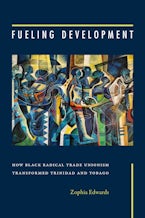Despite Trinidad and Tobago’s economic dependence on oil and gas production and its history of colonial exploitation of labor and resources, it enjoys relatively high democratic and redistributive development compared to other nations in the global South. In Fueling Development, Zophia Edwards draws on archival data, historical analysis, and Black radical political economic thought to trace Trinidad and Tobago’s success to a specific form of working-class mobilization she calls “liberation unionism.” A Black radical labor tradition, liberation unionism was multiracial, multisectoral, and gender inclusive; Pan-African, anti-imperial, anticolonial, and diasporic; and it advocated not only for workplace issues, but for economic, political, and social transformation. Emerging during the colonial period, liberation unionism forced the colonial state to increase its institutional capacity to promote equitable development. The movement persisted into the post-independence period and further compelled the independent state to channel oil windfalls toward increasing its ability to better serve the needs of the people. By uncovering liberation unionism’s power to create robust social and economic change, Edwards expands understandings of the relationship between development, race, labor, and political economy.
List of Abbreviations ix
Acknowledgments xiii
Introduction 1
1. Proletarianization, Race Making, and Capital Accumulation, 1498–1914 19
2. The 1919 Uprising and the Emergence of Liberation Unionism 45
3. The 1937 General Strike and the Deepening of Liberation Unionism 85
4. Decolonization and Fortuitous Failures 113
5. Postindependence Resurgence of Liberation Unionism 143
6. Comparing Worker Movements 181
Conclusion 199
Appendix: Methodology 213
Notes 217
Bibliography 267
Index

